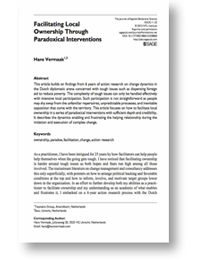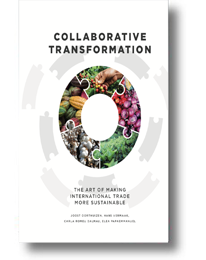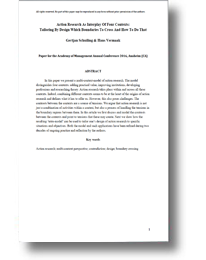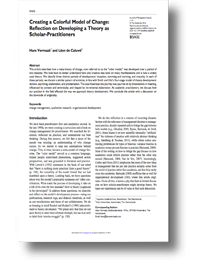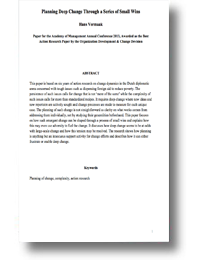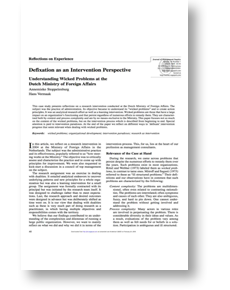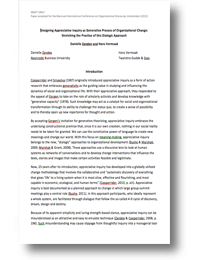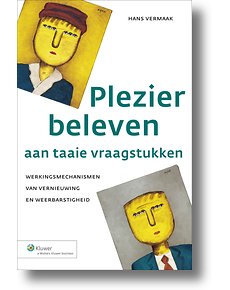The complexity of tough issues can only be handled effectively with intensive local participation. Such participation is not straightforward as people may shy away from the unfamiliar repertoires, unpredictable processes and inevitable opposition that come with the territory. This paper focuses on how to facilitate local ownership in a series of paradoxical interventions with sufficient depth and credibility. Read more…
publications
Facilitating local ownership through paradoxical interventions
Collaborative transformation
The art of making international trade more sustainable
International trade can make a huge difference towards sustainability, as over half of what is produced globally crosses national borders. Several of the United Nations 2030 Sustainable Development Goals – such as realizing ‘zero hunger’ and ‘no poverty’, ensuring all have ‘decent work’, and taking ‘climate action’ – crucially depend on transforming the way international trade is organized. But international value chains are complicated, involving many different people working in diverse contexts that change over time. Therefore Read more…
Four contexts of action research
Crossing boundaries for productive interplay
This paper explores how action research takes place within and between four contexts: adding practical value, improving institutions, developing professions, and contributing to theory. We argue that action research is more than those activities conducted within these contexts: it is a process of handling the generative tensions in the boundary regions. Read more…
Creating a colorful model of change
Reflection on developing a theory as scholar-practitioners
This article describes how, almost twenty years ago, we came up with a meta-theory of change, now referred to as the “color model,” and how that theory has developed over time. We look back, using Smith and Hitt’s four-stage model of theory development, to better understand how one creative idea took on many manifestations, became a robust theory and is now widely used. Read more…
Planning deep change through a series of small wins
Complex issues require continuous change that is planned incrementally. This paper focuses on how such emergent change can be shaped through a process of small wins and explains how this may even use adversity to fuel the change. The research shows how planning is anything but an innocuous support activity for change efforts and describes how it can either frustrate or enable deep change. Read more…
‘Defixation’ as an intervention perspective.
Understanding Wicked Problems at the Dutch Ministry of Foreign Affairs.
This case study presents reflections on a research intervention conducted at the Dutch Ministry of Foreign Affairs. The subject was the practice of administration. Its objective became to understand its “wicked problems” and to create action principles. It was an analytical research effort as well as a learning intervention. Read more…
Designing Appreciative Inquiry as a Generative Change Process
Stretching the Practice of this Dialogic Approach
Because of its apparent simplicity and luring strength-based stance, appreciative inquiry can be misunderstood as an attractive and easy to emulate technique. Such misunderstanding may cause slippage from thoughtful inquiry into a managerial tool to create motivational experiences at work rather than to engage with complex issues. Such slippage may ultimately turn the appreciative approach into another disappointing management fad. Fortunately, the prolific use of appreciative inquiry during the last decades provides us with rich experiential material for timely reflection, critique and renewal. Read more…
Read more…
A springboard for further learning
In: S.M. Adams, A. Zenzi (eds.) Preparing Better Consultants: The Role of Academia. Information Age Publishing, 2011
The challenges consultants face warrant ongoing education. When those practitioners have 15- 30 years of experience dealing with messy realities, however, it makes little sense for faculty to teach clean-cut models in standardized curricula. Read more…
Book summary ‘Enjoying tough issues’
Dynamics of innovation and stagnation
There is no shortage of tough issues: whether it is collaboration between professionals, external oriented government, sustainable economy or development cooperation. They are characterized by complexity of different kinds: many factors and many actors are involved. It makes tough issues hard to pin down and impossible to eradicate. The dominant change repertoires are ill equipped for tough issues: clear division of tasks and responsibilities, minimizing conflicts, drawing up organizational missions, rolling out large-scale change programs Read more…




